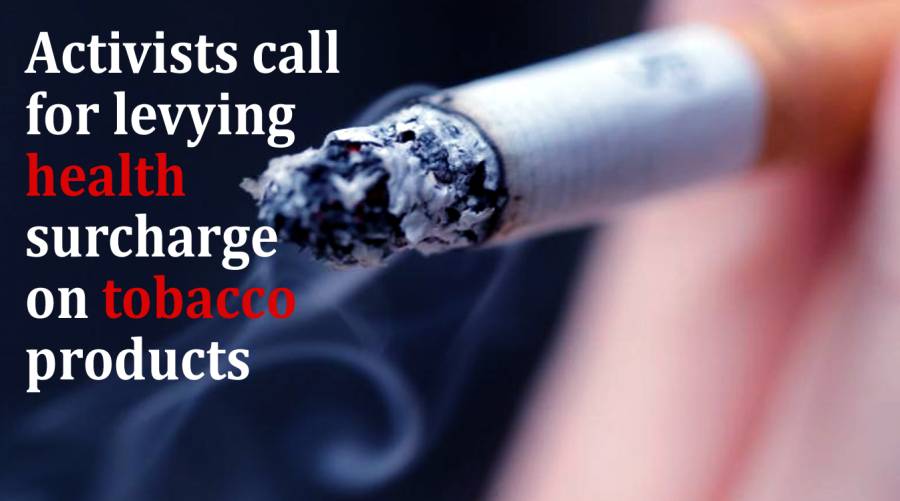
LAHORE: The Society for Protection of Rights of the Child (SPARC) has now urged the government to levy health-related charges on tobacco products, aiming to safeguard children from the perilous effects of tobacco usage.
According to the society's spokesperson, the role of points-of-sale (POS) in tobacco advertising holds substantial influence, particularly on potential young smokers. Multiple studies have demonstrated a clear correlation between exposure to tobacco POS promotion and an increased inclination towards smoking among young individuals, leading to experimental use and eventually regular smoking.
SPARC along with healthcare professionals has urged a collaborative approach between the government, civil society, and the public to address the concerning surge in smoking, posing significant health threats to the people, especially children who are enticed through advertisements and other covert tactics by cigarette manufacturers.
The widespread issue of tobacco consumption in Pakistan is deeply entrenched, with an estimated 20pc of adults regularly engaging in smoking. More alarmingly, this problem has extended its grasp to include children and adolescents, with nearly 1 in 10 children between the ages of 13 and 15 reported as tobacco users.
Recent advancements in Pakistan's tobacco control efforts have been witnessed, notably through the "Big Tobacco, Tiny Targets" campaign initiated by the Campaign for Tobacco-Free Kids (CTFK). This campaign has shed light on the prevalence of tobacco advertising in close proximity to schools and playgrounds, stressing the detrimental impact on the youth. Urgent calls have been made for more robust regulations to shield children from the influence of tobacco marketing.
Despite ongoing endeavors to enforce tobacco control measures, concerns have been expressed by civil society groups and public health advocates regarding the persistent violation of tobacco control laws by tobacco manufacturers across various retail points nationwide.
As part of the "Big Tobacco, Tiny Targets" campaign, trained data collectors monitored 268 tobacco retail outlets within a 100-meter radius of 133 schools in eight cities, including Islamabad, Murree, Larkana, Peshawar, Hafizabad, Pindi Bhattian, Jalalpur Bhattian, and Shakar Dara.
The Institute for Global Tobacco Control (IGTC) released research findings identifying four common point-of-sale marketing tactics, both in Pakistan and globally. Firstly, 94pc of cigarettes were strategically placed near children's favorite snacks and beverages, subtly associating tobacco products with familiar treats. Secondly, 95pc of tobacco advertisements were prominently displayed at eye level, easily accessible to young minds.
Moreover, the presence of flavoured cigarettes at these points-of-sale has raised concerns, as they could potentially attract younger demographics, particularly children. It is essential to note that in response to the campaign's study, the government of Pakistan approved a comprehensive Tobacco Advertising, Promotion, and Sponsorship (TAPS) ban [SRO 72(I)/2020] in 2020. However, a follow-up study by the IGTC in December 2021 revealed low compliance with the 2020 ban, indicating that tobacco companies are still finding ways to target young people with their marketing strategies.
With over 22 million tobacco users in Pakistan and the country witnessing more than 163,600 tobacco-related deaths annually, it is imperative for the government to invest in public education campaigns to raise awareness about the hazards of tobacco use. Experts emphasise that initiatives like "Big Tobacco, Tiny Targets" have brought the issue to the forefront, but considerable work remains to be done.
Pakistan has a unique opportunity to emerge as a regional leader by adhering to the World Health Organization's Framework Convention on Tobacco Control (FCTC) Articles 13 and 16, which address tobacco advertising, promotion, sponsorship, and sales to minors.
Furthermore, the country should implement MPOWER Strategies, particularly measure "E," focusing on enforcing bans on tobacco advertising, promotion, and sponsorship, which holds the potential to transform the nation's tobacco landscape.
Such campaigns not only raise awareness about the tobacco problem in the country but also demonstrate the government's commitment to protecting young people from tobacco marketing.


